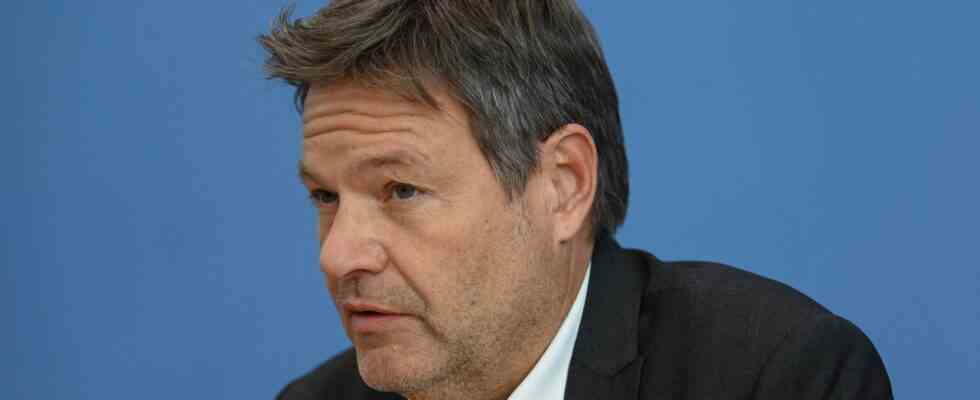Status: 10/12/2022 10:08 p.m
The German economy will shrink by 0.4 percent in the coming year: That is the autumn forecast by Economics Minister Habeck. It’s “bad,” but the government has the answers, he said daily topics.
According to the federal government, Germany is slipping into a recession because of the energy crisis. Economics Minister Robert Habeck (Greens) spoke in Berlin at the presentation of the autumn projection of “serious times”. According to the forecast, growth in the current year is only 1.4 percent, while the economy is likely to shrink by 0.4 percent in the coming year. Another growth of 2.3 percent is expected for 2024.
In the spring projection, the federal government still expected an increase in gross domestic product of 2.2 percent this year and 2.5 percent next year.
High prices slowed down industrial production
“We are currently experiencing a severe energy crisis, which is increasingly developing into an economic and social crisis,” said Habeck. The trigger for this crisis is the attack by Russian President Vladimir Putin on Ukraine. Russia had stopped gas supplies. As a result, energy prices are still at a very high level, according to the ministry. High prices slowed down industrial production.
Presentation of the autumn forecast: Significantly reduced economic expectations
Oliver Sallet, ARD Berlin, daily topics 10:15 p.m., October 12, 2022
Decrease in private consumption by one percent
The loss of purchasing power is also leaving its mark on price-adjusted private consumption, which, according to Habeck, will fall by one percent in the coming year. The federal government had announced a defense shield of up to 200 billion euros to support consumers and companies because of the sharp rise in energy prices. The planned gas price brake is also to be financed from this.
According to Habeck’s forecast, this will dampen the increase in consumer prices in the coming year. The federal government expects an inflation rate of 8.0 percent in the current year and 7.0 percent in the coming year.
Gas and electricity price brakes as an answer
“It’s bad,” said Habeck in the daily topics. “These are times that bring the German economy into difficult waters.” Many citizens are really afraid that they will not be able to pay their energy bills. But there are answers: the gas and then electricity price brake, i.e. “relief packages worth billions to cushion the price shock”.
Habeck admitted in the daily topics a. “But the reverse conclusion would be even more wrong, i.e. doing everything perfectly, thinking through every nuance of justice and then paying out the money in September next year – that would be a fatal political mistake.” Therefore, there must be an accompanying active social policy.
Robert Habeck, Federal Minister of Economics, on the autumn forecast presented and on the debate on the gas price brake
daily topics 10:15 p.m., 12.10.2022
“Numbers could have been worse”
Habeck still sees the figures for the autumn projection as confirmation of the effectiveness of the previous crisis policy. “The numbers are bad, you can’t explain that away,” said the Federal Minister for Economic Affairs, “but they could have been worse.”
In the daily topics Habeck emphasized: “That’s because we’ve worked hard politically, the storage facilities are full. The prices have already gone down a bit on the markets – not far enough and it doesn’t go down well with the citizens, but they do have gone down a bit. We are rebuilding the infrastructure, we will create alternative routes. We have new trading partners – and we have already put together relief packages.”
According to Habeck, the federal government had not been inactive and had defended itself against Putin. He referred in particular to estimates by experts from the spring, who would have predicted an economic downturn of between three and nine percent in the event of a complete loss of Russian gas supplies.
Gas storage almost full
As far as the energy supply with gas is concerned, Germany will probably already achieve the goal of filling the gas storage facilities to 95 percent on Thursday, according to the Federal Minister for Economic Affairs. “Nevertheless, gas is a scarce commodity and we need to use it sparingly in order to get through the winter well,” said Habeck.

